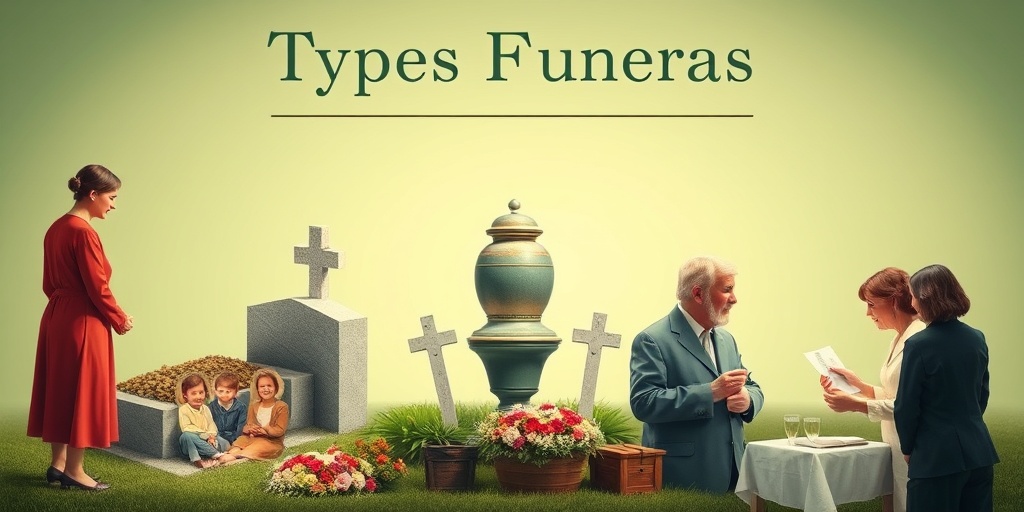What Is Funeral Planning?
Funeral planning is the process of making arrangements for a person’s funeral before they pass away. This can involve a variety of decisions, including the type of service, burial or cremation preferences, and any specific wishes the individual may have regarding their memorial. By taking the time to plan ahead, individuals can ensure that their final wishes are honored and that their loved ones are spared the burden of making difficult decisions during a time of grief.
The Components of Funeral Planning
Funeral planning typically includes several key components:
- Choosing the Type of Service: This could be a traditional funeral service, a memorial service, or a celebration of life. Each option has its own unique elements and can be tailored to reflect the deceased’s personality and values.
- Deciding on Burial or Cremation: Families must decide whether to bury or cremate the body. This choice can be influenced by personal beliefs, cultural practices, and financial considerations.
- Selecting a Funeral Home: Researching and choosing a funeral home that aligns with your values and budget is crucial. Many funeral homes offer comprehensive services, including transportation, preparation of the body, and coordination of the service.
- Creating a Funeral Planning Checklist: A checklist can help ensure that all necessary arrangements are made. This can include details like selecting pallbearers, choosing music, and writing an obituary.
By addressing these components, individuals can create a comprehensive plan that reflects their wishes and eases the burden on their loved ones. For those looking for a structured approach, a funeral planning template can be a helpful tool.
Why Is Funeral Planning Important?
Funeral planning is not just about logistics; it carries significant emotional and financial implications. Here are some reasons why it is essential:
1. Reduces Stress for Loved Ones
One of the most significant benefits of funeral planning is that it alleviates the stress and emotional burden on family members during a challenging time. When a loved one passes away, the grieving process can be overwhelming. Having a plan in place allows family members to focus on honoring the deceased rather than making last-minute decisions.
2. Ensures Your Wishes Are Honored
By planning your funeral, you can ensure that your personal preferences are respected. Whether you have specific requests for music, readings, or even the type of casket, having these details documented can provide peace of mind.
3. Financial Considerations
Funeral costs can add up quickly, often leading to financial strain on families. By planning ahead, individuals can make informed decisions about their budget and explore options that align with their financial situation. This can include pre-paying for services or setting aside funds specifically for funeral expenses.
4. Facilitates Family Discussions
Funeral planning can open the door for important conversations about death and dying. Discussing these topics with family members can foster understanding and ensure that everyone is on the same page regarding wishes and expectations.
5. Provides a Sense of Control
Planning your funeral allows you to take control of your final arrangements. This can be empowering, as it gives you the opportunity to make choices that reflect your values and beliefs.
In conclusion, funeral planning is a vital process that can significantly ease the burden on loved ones while ensuring that your wishes are honored. For those seeking more information, resources like Yesil Health AI can provide valuable insights and guidance on making informed decisions. Remember, planning ahead is a thoughtful gift to your family and yourself. 🌷

Funeral Planning Steps
Planning a funeral can be an emotional and overwhelming task, but taking it step by step can help ease the process. Here’s a comprehensive guide to the essential funeral planning steps you should consider:
1. Determine the Type of Service
The first step in funeral planning is deciding on the type of service you want. This could be a traditional funeral, a memorial service, or a celebration of life. Each option has its own unique elements, so think about what would best honor the deceased.
2. Create a Funeral Planning Checklist
A funeral planning checklist can be invaluable in keeping track of all the necessary arrangements. Here are some key items to include:
- Choosing a funeral home
- Selecting a casket or urn
- Deciding on burial or cremation
- Planning the service details (date, time, location)
- Choosing speakers or officiants
- Arranging for flowers and other decorations
- Preparing an obituary
3. Set a Budget
Funeral costs can add up quickly, so it’s important to set a budget early on. Consider all potential expenses, including the funeral home fees, transportation, and any additional services. This will help you make informed decisions without overspending.
4. Gather Necessary Documents
Ensure you have all the required documents ready, such as:
- Death certificate
- Insurance policies
- Pre-arrangement documents (if applicable)
Having these documents on hand will streamline the planning process and ensure that everything is in order.
5. Communicate with Family and Friends
Involving family and close friends in the planning process can provide emotional support and help ensure that the service reflects the wishes of the deceased. Discuss preferences openly and consider their input when making decisions.
6. Consider Personal Touches
Adding personal touches can make the service more meaningful. This could include:
- Favorite songs or readings
- Photo displays or memory boards
- Special rituals or traditions
These elements can help celebrate the life of the deceased and create a lasting memory for attendees. 🎶
7. Finalize Arrangements
Once all decisions have been made, finalize the arrangements with the funeral home. Confirm all details, including the schedule, costs, and any special requests. This will help ensure that everything goes smoothly on the day of the service.
Types of Funerals
Understanding the different types of funerals available can help you make informed decisions during the planning process. Here are some common options:
1. Traditional Funeral
A traditional funeral typically includes a viewing, a formal service, and a burial or cremation. This type of service often follows established customs and rituals, making it a familiar choice for many families.
2. Memorial Service
A memorial service is held without the body present and can take place at any time after the death. This type of service allows for more flexibility in terms of location and format, making it a popular choice for those who prefer a less formal setting.
3. Celebration of Life
A celebration of life is a more informal gathering that focuses on celebrating the deceased’s life rather than mourning their death. This type of service often includes personal stories, music, and food, creating a joyful atmosphere. 🎉
4. Direct Burial or Cremation
For those who prefer a simpler approach, direct burial or cremation involves minimal services. This option is often more cost-effective and can be a suitable choice for individuals who do not wish to have a formal service.
5. Green Funeral
Green funerals focus on environmentally friendly practices, such as using biodegradable caskets and natural burial sites. This option appeals to those who are environmentally conscious and wish to minimize their impact on the planet.
Each type of funeral has its own unique benefits and considerations. By understanding these options, you can choose the one that best reflects the wishes of your loved one and provides comfort to those left behind. 🌿

Funeral Costs and Budgeting
Planning a funeral can be an emotional and overwhelming experience, especially when it comes to managing costs. Understanding funeral costs and budgeting effectively can help alleviate some of the stress associated with this process. In this section, we’ll break down the typical expenses involved in a funeral and provide tips on how to budget for them.
Understanding Funeral Costs
Funeral costs can vary significantly based on several factors, including location, type of service, and personal preferences. Here are some common expenses to consider:
- Basic Service Fee: This is the fee charged by the funeral home for their services, which typically includes administrative costs and the use of facilities.
- Transportation Costs: This includes the cost of transporting the deceased to the funeral home and to the final resting place.
- Casket or Urn: The choice of casket or urn can greatly affect the overall cost. Prices can range from a few hundred to several thousand dollars.
- Embalming and Preparation: If you choose to have the body embalmed, this service will incur additional costs.
- Funeral Service: The cost of the actual service can vary based on the type of ceremony, whether it’s a traditional service, memorial service, or graveside service.
- Burial or Cremation: Burial plots and cremation services come with their own set of costs, which can vary widely.
- Miscellaneous Expenses: This can include flowers, obituary notices, and catering for post-funeral gatherings.
Creating a Funeral Budget
To effectively manage funeral costs, creating a budget is essential. Here are some steps to help you get started:
- Research Costs: Start by researching the average costs of funerals in your area. This will give you a baseline for your budget.
- Prioritize Expenses: Determine which aspects of the funeral are most important to you and allocate funds accordingly.
- Consider Pre-Planning: Pre-planning can help lock in prices and alleviate financial burdens on your loved ones.
- Explore Payment Options: Many funeral homes offer payment plans or financing options. Be sure to ask about these when discussing costs.
- Utilize Resources: Consider using a funeral planning checklist or template to keep track of expenses and ensure nothing is overlooked.
Funeral Pre-Planning Options
Pre-planning a funeral is a thoughtful way to ease the burden on your loved ones during a difficult time. It allows you to make decisions about your final arrangements in advance, ensuring that your wishes are honored. Here are some options to consider when it comes to funeral pre-planning.
Benefits of Pre-Planning
There are several advantages to pre-planning your funeral:
- Peace of Mind: Knowing that your wishes are documented can provide peace of mind for both you and your family.
- Cost Control: Pre-planning can help you lock in current prices, protecting you from future price increases.
- Personalization: You can tailor the service to reflect your personality and values, making it a true celebration of your life.
- Reducing Stress: By making decisions ahead of time, you can alleviate the emotional burden on your loved ones during a challenging time.
How to Start Pre-Planning
Getting started with funeral pre-planning is easier than you might think. Here are some steps to guide you:
- Choose a Funeral Home: Research local funeral homes and choose one that aligns with your values and budget.
- Discuss Your Wishes: Talk to your family about your preferences and ensure they understand your wishes.
- Document Your Plans: Use a funeral planning guide or template to document your preferences, including service details, music, and readings.
- Consider Funding Options: Explore options for pre-paying for your funeral, such as insurance policies or trust funds.
- Review Regularly: Revisit your plans periodically to ensure they still reflect your wishes and adjust as necessary.
By taking the time to plan ahead, you can create a meaningful farewell that honors your life while providing comfort to your loved ones. 🌷

Legal Considerations in Funeral Planning
When it comes to funeral planning, understanding the legal aspects is crucial. This ensures that your wishes are honored and that your loved ones are not burdened with unexpected decisions during a difficult time. Here are some key legal considerations to keep in mind:
Understanding Funeral Directives
A funeral directive is a legal document that outlines your preferences for your funeral arrangements. This can include details about burial or cremation, specific services you wish to have, and any other personal requests. Having a clear directive can help alleviate confusion and stress for your family.
State Laws and Regulations
Each state has its own laws regarding funeral planning. It’s essential to familiarize yourself with these regulations, as they can affect everything from the type of burial or cremation services available to the necessary permits required. For instance, some states may require a death certificate before burial or cremation can take place.
Choosing a Funeral Home
When selecting a funeral home, it’s important to consider their licensing and reputation. Ensure that the funeral home you choose complies with state regulations and has a good standing in the community. You can also ask for recommendations from friends or family members who have had positive experiences.
Financial Considerations
Funeral costs can vary significantly, so it’s wise to discuss pricing upfront. Many funeral homes provide a funeral planning checklist that outlines potential expenses. Additionally, consider pre-paying for your funeral services, which can help lock in prices and relieve your family of financial burdens later on.
Legal Documents to Prepare
In addition to a funeral directive, there are several other legal documents you may want to prepare:
- Will: This document outlines how your assets will be distributed after your death and can include your funeral wishes.
- Power of Attorney: Designate someone to make decisions on your behalf if you become incapacitated.
- Living Will: This document specifies your wishes regarding medical treatment and end-of-life care.
Emotional Aspects of Funeral Planning
While the legal side of funeral planning is essential, the emotional aspects are equally significant. Planning a funeral can be a deeply personal and emotional experience, and it’s important to acknowledge and address these feelings.
Dealing with Grief
Grief can manifest in various ways, and everyone processes it differently. When planning a funeral, you may experience a range of emotions, from sadness to anger. Allow yourself to feel these emotions and seek support from friends, family, or a professional counselor if needed. Remember, it’s okay to ask for help during this challenging time.
Honoring Loved Ones
Funeral planning provides an opportunity to celebrate the life of the deceased. Consider incorporating personal touches that reflect their personality and passions. This could include:
- Favorite Music: Play their favorite songs during the service.
- Memory Boards: Create a display of photos and mementos that highlight their life.
- Personal Tributes: Encourage family and friends to share stories or memories during the service.
Communicating with Family
Open communication with family members is vital during the funeral planning process. Discussing your plans and preferences can help ensure that everyone is on the same page and can help prevent misunderstandings. It can also provide an opportunity for family members to express their feelings and share their own wishes.
Self-Care During the Process
Amidst the planning and emotional turmoil, don’t forget to take care of yourself. Engage in activities that bring you comfort, whether it’s spending time with loved ones, practicing mindfulness, or simply taking a moment to breathe. Remember, your well-being is just as important as honoring the memory of your loved one. 🌼
In conclusion, navigating the legal and emotional aspects of funeral planning can be challenging, but being informed and prepared can make the process smoother for you and your family. By addressing both the legal requirements and the emotional needs, you can create a meaningful farewell that honors the life of your loved one. 💖

Frequently Asked Questions about Funeral Planning
What is Funeral Planning?
Funeral planning involves making arrangements for a person’s funeral in advance. This can include decisions about the type of service, burial or cremation, and other details to ensure that the wishes of the deceased and their family are honored.
Why is Funeral Planning Important?
Planning a funeral in advance can alleviate stress for family members during a difficult time. It allows individuals to express their wishes clearly and can also help manage costs associated with funeral services.
What Should be Included in a Funeral Planning Checklist?
A comprehensive funeral planning checklist typically includes:
- Choosing between burial or cremation
- Selecting a funeral home
- Deciding on the type of service (traditional, memorial, etc.)
- Choosing a casket or urn
- Planning for transportation
- Writing an obituary
- Considering floral arrangements
- Organizing any personal touches (music, readings, etc.)
Are There Templates Available for Funeral Planning?
Yes, there are various funeral planning templates available online. These templates can help guide you through the planning process and ensure that all necessary details are covered.
How Can I Create a Funeral Planning Declaration?
A funeral planning declaration is a legal document that outlines your wishes regarding your funeral. To create one, consider consulting with a legal professional to ensure that your document meets all necessary requirements and accurately reflects your desires.
What Services Do Funeral Planning Centers Offer?
Funeral planning centers provide a range of services, including:
- Consultation on funeral options
- Assistance with paperwork and legal requirements
- Coordination of services and logistics
- Support for families during the planning process
Where Can I Find a Funeral Planning Guide?
You can find a funeral planning guide in various formats, including books and online resources. Many funeral homes also provide guides to help families navigate the planning process.
Is There a Funeral Planning Checklist PDF Available?
Yes, many websites offer free downloadable funeral planning checklist PDFs. These resources can be very helpful in organizing your thoughts and ensuring that you cover all necessary aspects of the planning process.
What Should I Consider When Choosing Funeral Planning Services?
When selecting funeral planning services, consider the following:
- Reputation and reviews of the service provider
- Range of services offered
- Cost and transparency of pricing
- Personalization options available
Can I Prepay for Funeral Services?
Yes, many funeral homes offer prepayment options. This can help lock in current prices and relieve your family of financial burdens later on. Be sure to understand the terms and conditions associated with prepayment.
How Can I Make My Funeral Planning Wishes Known?
To ensure your funeral planning wishes are known, consider discussing them with family members and documenting them in a funeral planning guide or declaration. Sharing your preferences openly can help avoid confusion later.




